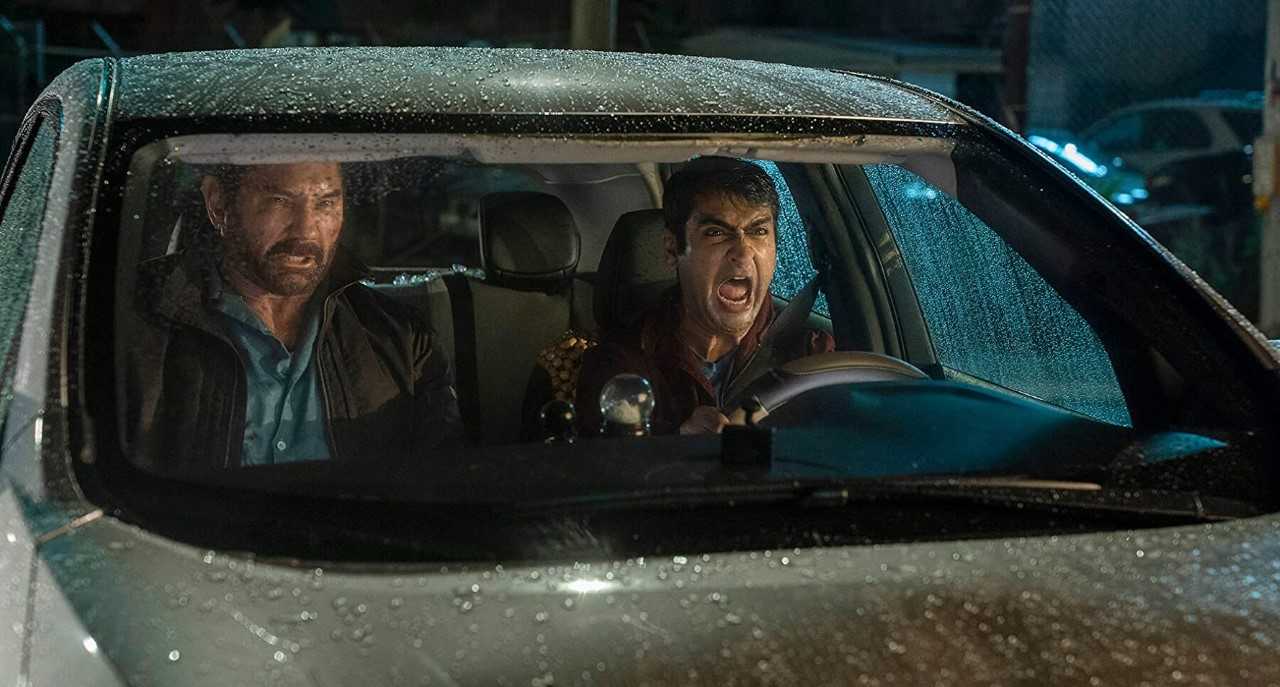“Stuber” is a comedy that puts a new spin on the buddy cop formula: only one of the two is a police officer, and the other is an easily frightened civilian who—wait, that’s the plot of Ride Along? Ok, well, Stuber features an interracial double act driving around to stop a criminal organization of—shoot, that’s also Cop Out. Uh, Stuber is a movie you’ve seen before, but with Kumail Nanjiani and Dave Bautista this time. And you’ve heard of Uber, right? That’s a new thing.
It’s probably the only buddy cop movie in history to open with the theme song to Lolita, though. As the inexplicable “wow wow ya ya”s ring out over an establishing shot of Los Angeles, we’re introduced to LAPD detective Vic Manning: he’s big, he’s tough, he’s Dave Bautista. Vic’s on a manhunt for a dangerous drug lord, but the mission goes south, partially because his glasses fall off and he’s practically blind without them. Just as inconveniently, his next chance to catch the drug lord comes during his recovery from LASIK eye surgery—even more blind than usual, he’s forced to rely on an Uber driver named Stu to get him across LA.
Now, I know what you’re thinking: can police officers be sent into the field if they can’t see without their glasses? No. There are rules against that sort of thing. But Stuber doesn’t play by the rules of reality—or by the rules of sensible storytelling, for that matter. It may be a silly comedy, but it’s hard to ignore how this movie has more hole than plot.
Stuber’s lack of logic ranges from small inconsistencies to movie-breaking mistakes. Near the beginning, we see that Stu’s Uber rating is 4.1, despite the app’s menu showing us that almost all of his reviews are 1-star. The mathematical impossibility is a minor error, yes, but it’s also a warning sign of things to come. For example, Vic spends the first act
bumping into and tripping over things—he can’t see further than a foot in front of him, due to temporary effects of his eye surgery—but when the movie reaches its first firefight, he suddenly regains the ability to shoot people in the head with pinpoint accuracy, and then reverts to blindness right after. If you have a brain, Stuber will insult your intelligence.
And if you have a heart, it’ll insult that too. The movie is full of strained virtue signaling—someone has a Hilary Clinton tattoo; someone else complains about mansplaining—but Stuber is just as regressive as the movies it’s trying to imitate. Homosexuality is the punch line of multiple jokes, female characters are either prizes for heroic (read: violent) behavior or sources of sexual motivation, and police brutality is repeatedly made light of. Stuber may toss in a line or two about how it’s bad, but police brutality is always played for comedy regardless, and it continually serves as a consequence-free route for solving the protagonists’ conflicts.
The movie is content to skim to lowest common denominator, but the stars put in far more effort than the writer and director. Nanjiani in particular has a gift for chewing up terrible lines and spitting out something funny. Bautista, like other wrestlers-turned-Hollywood-actors, is keenly aware of his imposing stature and uses it to his comedic advantage. Watching their budding dynamic makes you wish they had better material.
At this point, you’re probably aware that Stuber is a bad movie—but is it funny? I kept track for you: it didn’t earn any big laughs from me, but I chuckled a total of 19 times. Now it’s up to you to decide whether one chuckle per five and a half minutes is worth your time and money.
★½ (1.5/5)




